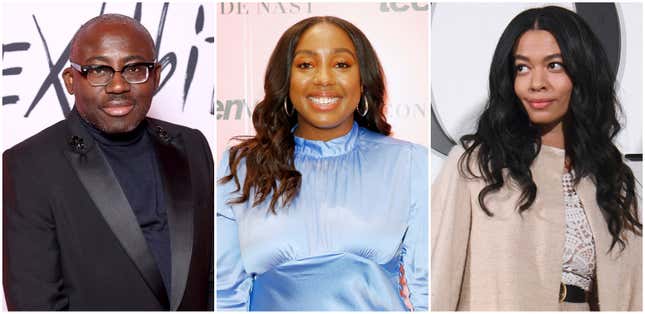
Fashion prides itself on being one well-heeled step ahead of the moment, and setting the trends, rather than following them. But the converging moments that comprised 2020 demanded more introspection from the industry that is always looking forward; as an already raging pandemic debilitated economies and discretionary spending worldwide, many hid behind black boxes this spring as racial justice also emerged as a global conversation. In a moment that required action and substantive change, those who demanded more from the multibillion-dollar industry proved to be the true visionaries, compelling initiatives, restructuring and rethinking that will make this moment more than a trend, changing the face of fashion for future generations.
These are the types of visionaries this year’s British Fashion Awards chose to honor in place of their typical awards ceremony, which has historically celebrated the designer and models who make the industry beautiful. By contrast, the message of the Fashion Awards 2020 was that “pretty is as pretty does,” as explained via its website:
The Fashion Awards 2020 honored and celebrated the designers, brands, creatives and individuals who have led change within the fashion industry this year; from those who bravely faced this challenging year with pro-active responses to the global pandemic, showed leadership and creative resilience over the past year, to the ones who stood up against prejudice within the fashion industry and fight for change.
In a virtual ceremony that in no way attempted to mimic the red carpet and major fashion moments of years past, 20 honorees were recognized “for humanitarian efforts, adapting business models, responding to their community’s needs as well as for leadership and creative resilience under four categories: Environment, Community, People and Creativity,” says the BFA website. Of those 20, seven honorees were Black designers, editors, and innovators. “Gone are the traditional awards categories that mostly favored a select few megabrands” noted Women’s Wear Daily (WWD), which also reported. “The lack of industry fanfare and sparkle made way for a more powerful message: Let’s change.”
The full list is as follows:
A Sai Ta; Anya Hindmarch; Brother Vellies Creative Director Aurora James for the 15 Percent Pledge Chanel; Christopher Raeburn; British Vogue Editor-in-Chief Edward Enninful; Bethany Williams, Cozette McCreery, Holly Fulton and Phoebe English of the Emergency Designer Network; Gabriela Hearst; Grace Wales Bonner; Jonathan Anderson; Kenneth Ize; Kim Jones; Teen Vogue Editor-in-Chief Lindsay Peoples Wagner and Sandrine Charles for Black in Fashion Council; Michael Halpern; Miuccia Prada and Raf Simons; Priya Ahluwalia; Riccardo Tisci and Burberry; Samuel Ross; Stella McCartney and he Fashion Pact.
A-Cold-Wall* founder and designer Samuel Ross gave insight into why he was honored in the “People” category for “encouraging equal, diverse, empowered workforces from head office to supply chain and shop floor.” Having launched a Black Lives Matter-themed financial aid initiative and offering grants to Black-owned businesses, he told WWD:
“We need to make sure that we are adding visibility to what’s happening from a racial perspective, or from an employment perspective. I believe we need to start looking at giving back to the consumer base, the followers, who have taken the time to invest in what we make and have to say. We need to give it back. It needs to be a two-way conversation. It needs to be more plural, it can’t just be selling goods to people.”
Another “People” honoree, designer Priya Ahluwalia, was honored for taking taking a holistic approach to the buzzy concepts of sustainability and social responsibility.
“I guess what they really like about me was the way I represent the community and I like telling people stories that are not necessarily at the forefront of fashion,” she told WWD, also adding, “It’s very important when we think about positive fashion, that we really think about people and the planet before profit...How can we work with our business not only to support but regenerate communities and the environment with different craft, social and development initiatives?”
It has been a year which confronted us with our inadequacies and vulnerabilities in so many ways, simultaneously. In considering how the fashion world can and should move forward with its diversity and inclusion efforts, perhaps Nigerian honoree Kenneth Ize, honored in the “Community” category for his commitment to supporting local economies and craftspeople through his label, said it best:
“Moving forward, the community will have to be more than just a means to an end,” he told WWD. “There has to be a higher value placed on the community, as it offers much more...my hope is to one day look around and see more brands like mine on runways and in stores all over the world.”
The full presentation of the Fashion Awards 2020 are available below.

